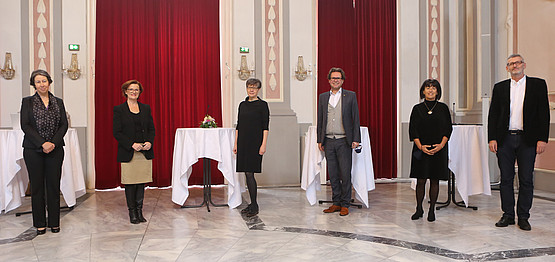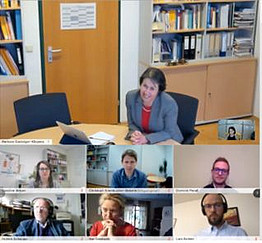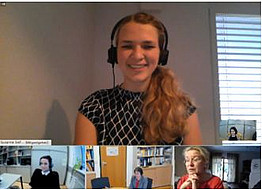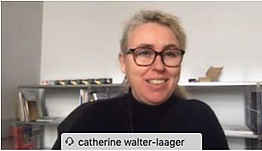End of this page section.
Go to overview of page sections.
Begin of page section: Additional information:
End of this page section.
Go to overview of page sections.
Report Opening Week FZIB
Begin of page section: Contents:
Opening of the Research Center for Inclusive Education – Week of Inclusion
1. Official opening of the Research Center for Inclusive Education

The Research Center for Inclusive Education was officially opened on Friday, November 13, 2020 by the leadership team Univ.-Prof. Dr. Barbara Gasteiger-Klicpera (Uni Graz), Prof. Dr. Andrea Holzinger (PHSt) and Prof. David Wohlhart, BEd (KPH Graz), followed by speeches of the rectors of all three institutions Dr. Andrea Seel (KPH Graz), Dr. Elgrid Messner (PHSt) and Ao. Univ.-Prof. Dr. Martin Polaschek (Uni Graz).
The program for the opening of the center can be found here (in German Language).
The event was recorded and the different videos (mostly in German language) can be found below:
- The video recording of the entire event can be found here.
- Video recording with the speeches of the leadership team and the rectors, as well as the messages by Dr. Peter Piffl-Perčević, representative of the city of Graz, City Councilor; Dipl.-Päd. MMag. Dr. Agnes Totter, Bed, member of the National Council; Mag. Doris Kampus, representative of the state of Styria, State Councilor; Helena Dalli, European Commissioner for Equality; and Dr. Heinz Faßmann, Austrian Federal Minister of Education, Science and Research. If you want to watch the video with subtitles (mostly in German language) click here.
- The speech of Mrs. Helena Dalli, European Commissioner for Equality, can be found here.
- The speech of Dr. Heinz Faßmann, Austrian Federal Minister of Education, Science and Research, can be found here (in German language).
- The keynote presentation of Prof. Mel Ainscow, international expert for inclusion at the University of Manchester, on topic “Equity: the way of achieving excellence in education” can be found here.
- Video presentation of Dr. Ingo Bosse, expert for inclusive and digital education at the Technical University of Munich on the topic “Mediatized living environments in inclusive contexts - challenges for school education and (digital) educational work”. If you want to watch the video with subtitles (in German language) click here. In addition, the presentation of Dr. Ingo Bosse as a PDF-version can be downloaded here.
- Video recording of the discussion on the topic “Centers for Inclusion Research - Opportunities and Risks” with Prof. Dr. Vera Moser, Founding Director of the Center for Inclusion Research at the Humboldt University of Berlin and the leadership team of the Research Center for Inclusive Education. If you want to watch the video with subtitles (in German language) click here.
- The closure of the event can be found here. If you want to watch the video with subtitles (in German language) click here.
A photo album of the opening ceremony on November 13, 2020 made by Martin Grössler (PHSt) can be found here:
2. Online presentations of current research projects in the field of inclusive education

Various online presentations were organized as parallel sessions on Monday, November 9, 2020 and Tuesday, November 10, 2020 in three online venues. Different members of the enter’s research team presented their current research projects in the field of inclusive education.
The short program for this two-day event can be found here, and the detailed program with descriptions of the research projects can be found here. The diverse presentations in German language can be downloaded as PDF-versions from the links below:
- Presentation “Distance learning for students with disabilities: Perspectives of teachers” ("Fernunterricht für Schüler*innen mit Behinderungen: Perspektiven von Lehrpersonen") - Prof. Dr. Andrea Holzinger; Prof. Edvina Bešić, PhD; Prof. Mag. Ursula Komposch; Prof. David Wohlhart, Bed
- Presentation “A common inclusive language: ICF@School” - Prof. Silvia Kopp-Sixt, MA & Katerina Todorova, MSc
- Presentation “Contextual and compositional effects in school regarding social-emotional development in lower secondary schools” ("Schulische Kontext- und Kompositionseffekte hinsichtlich der sozial-emotionalen Entwicklung in der Sekundarstufe I") - HS-Prof. Dr. Mathias Krammer, Bakk. MA PhD.
- Presentation “ReHaRe: Reaching the 'hard to reach': Inclusive responses to diversity through child-teacher dialogue” - Univ.-Prof. Dr. Barbara Gasteiger-Klicpera; Prof. Edvina Bešić, MSc PhD and Ass.-Prof. Mestre? Mag. Lisa Paleczek, PhD
- Presentation “RegioDiff: Learning about the regions in Styria: Differentiated teaching materials for inclusive teaching in the fourth grade” ("RegioDiff: Regionen der Steiermark kennenlernen: Differenzierte Sachunterrichtsmaterialien für inklusiven Unterricht in der vierten Schulstufe") - Ass.-Prof. Mestre? Mag. Lisa Paleczek, PhD; Daniela Ender, MSc and Prof. David Wohlhart, Bed
- Presentation “IMAS II: Improving Assistance in Inclusive Educational Settings II” - Caroline Breyer, Bakk. Phil MSc PhD; Univ.-Prof. Dr. Barbara Gasteiger-Klicpera
- Presentation “HeLi-D: Health-literacy and diversity for students in lower secondary schools” ("HeLi-D: Health-Literacy und Diversity für Schülerinnen und Schüler der Sekundarstufe I") - Katharina Maitz, BA BA MA; Dominik Pendl, MSc and Univ.-Prof. Dr. Barbara Gasteiger-Klicpera
- Presentation “Usage of digital media by persons with disabilities within disability care services. Participative research project“ ("Nutzung digitaler Medien von Personen mit Behinderungen in der Behindertenhilfe. Partizipatives Forschungsprojekt") - Prof. Mag. Dr. Martina Kalcher, MSc
- Presentation “Inclusion is more than special education? The study of the specialization in inclusive education in the EVSO (development association South-East)” („Inklusion ist mehr als Sonderpädagogik? Das Studium der Spezialisierung Inklusive Pädagogik im EVSO") - Univ.-Prof. Dr Barbara Gasteiger-Klicpera; Prof. Dr. Andrea Holzinger; Prof David Wohlhart, BEd
- Presentation “High-performance or also equitable? How are primary school systems developing in Europa“ ("Leistungsstark oder auch gerecht? Wie entwickeln sich die Grundschulsysteme in Europa?") - Univ.-Prof. Dr. phil. Heike Wendt, University Professor for Empirical Educational Research, University of Graz
- Presentation “The tendency towards socially desirable responses in the measurement of attitudes towards inclusion” ("Die Tendenz zu sozial erwünschten Antworten bei der Messung von Einstellungen zu Inklusion") - Dr. Timo Lüke, M.Ed., Academic Councilor at the Faculty of Rehabilitation Sciences at the Technical University of Dortmund and Professor for Inclusive Education at the Institute for Educational Research and Teacher Education at the University of Graz.
The video recordings (in German language) of the presentations in the three online venues can be found via the links below:
November 9, 2020
- Online venue 1 – presented research projects: “Distance learning for students with disabilities: Perspectives of teachers”; “A common inclusive language: ICF@School”; “Contextual and compositional effects in school regarding social-emotional development in lower secondary schools”.
- Online venue 2 – presented research projects: “ReHaRe: Reaching the 'hard to reach': Inclusive responses to diversity through child-teacher dialogue”; “RegioDiff: Learning about the regions in Styria: Differentiated teaching materials for inclusive teaching in the fourth grade”; “IMAS II: Improving Assistance in Inclusive Educational Settings II”.
- Online venue 3 – presented research projects: “HeLi-D: Health-literacy and diversity for students in lower secondary schools”; “Usage of digital media by persons with disabilities within disability care services. Participative research project“; “Inclusion is more than special education? The study of the specialization in inclusive education in the EVSO (development association South-East)”.
- Online presentation - “High-performance or also equitable? How are primary school systems developing in Europa“.
November 10, 2020
- Online venue 1 – presented research projects: “Distance learning for students with disabilities: Perspectives of teachers”; “A common inclusive language: ICF@School”; “Contextual and compositional effects in school regarding social-emotional development in lower secondary schools”.
- Online venue 2 – presented research projects: “ReHaRe: Reaching the 'hard to reach': Inclusive responses to diversity through child-teacher dialogue”; “RegioDiff: Learning about the regions in Styria: Differentiated teaching materials for inclusive teaching in the fourth grade”; “IMAS II: Improving Assistance in Inclusive Educational Settings II”.
- Online venue 3 – presented research projects: “HeLi-D: Health-literacy and diversity for students in lower secondary schools”; “Usage of digital media by persons with disabilities within disability care services. Participative research project“; “Inclusion is more than special education? The study of the specialization in inclusive education in the EVSO (development association South-East)”.
- Online presentation - “The tendency towards socially desirable responses in the measurement of attitudes towards inclusion”.
3. Workshop “COVID-19 – The end of inclusion? Salvation through digital education?”
The online workshop on the topic “COVID-19 – The end of inclusion? Salvation through digital education?” („COVID19 – Das Ende der Inklusion? Rettung durch Digitalisierung?“) was organized on Wednesday, November 11, 2020. The program for the workshop in German language can be downloaded here.
4. “Inclusion Forum Graz”
The annual congress “Inclusion Forum Graz” was organized on Thursday, November 12, 2020. The main topic of this year’s forum was “Reaching all children in school” („Alle Kinder im Unterricht erreichen“). After the opening speeches of Univ.-Prof. Dr. Barbara Gasteiger-Klicpera (University of Graz) and vice rector Univ.-Prof. Dr. Catherine Walter-Laager (University of Graz), the Erasmus+ project “Reaching the ‚Hard to reach’” was presented.
After the presentation of the project and a short discussion, Mrs. Ursula Vennemann (President of the association Lebenshilfe Graz und Umgebung – Voitsberg) awarded the annual “Lebenshilfe research prize” for researchers in the field of inclusion. The following scientific research projects were awarded:
- “Intellectual disability and dementia - A qualitative study regarding the situation of professionals working with people with intellectual disability and dementia in institutions for disability care in Styria” („Intellektuelle Behinderung und Demenz – Eine qualitative Studie zur Situation des Fachpersonals in der Arbeit mit Menschen mit intellektueller Behinderung und Demenz in Einrichtungen der Behindertenhilfe in der Steiermark“) – Mathieu Glatz, MSc and Dominik Pendl, MSc. After the event, this information was published in the “Kleinen Zeitung”, a daily newspaper in Styria. The published article in German language can be downloaded here.
- “Growing up in alcohol-exposed families - a multi-perspective study focusing on obstacles and resources of coping with life for children in alcohol-exposed families” („Aufwachsen in alkoholbelasteten Familien – Eine multiperspektivische Studie mit Fokus auf Hemmnisse und Ressourcen der Lebensbewältigung von Kindern in alkoholbelasteten Familien“) - Mag. Ilse Gradwohl, PhD.
At the end of the event, university students presented their scientific work on inclusive education in the form of posters, and the selected three “best poster presentations” were awarded.
Data protection:
The participants were informed that the events will be recorded, and that the videos will be made available online.
End of this page section.
Go to overview of page sections.
Begin of page section:
End of this page section.
Go to overview of page sections.



